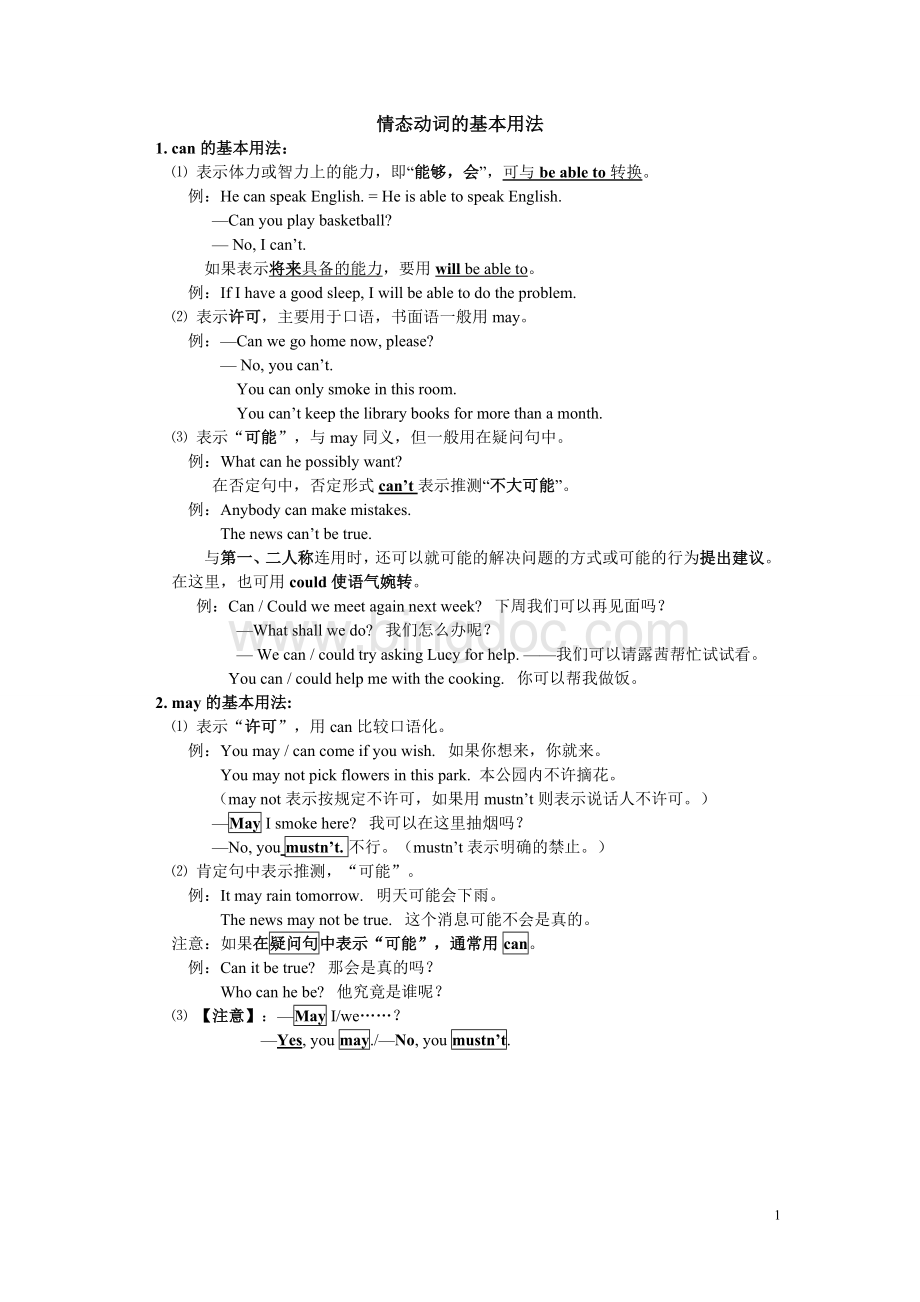上海牛津英语情态动词的基本用法讲解及练习.doc
《上海牛津英语情态动词的基本用法讲解及练习.doc》由会员分享,可在线阅读,更多相关《上海牛津英语情态动词的基本用法讲解及练习.doc(6页珍藏版)》请在冰点文库上搜索。

情态动词的基本用法
1.can的基本用法:
⑴表示体力或智力上的能力,即“能够,会”,可与beableto转换。
例:
HecanspeakEnglish.=HeisabletospeakEnglish.
—Canyouplaybasketball?
—No,Ican’t.
如果表示将来具备的能力,要用willbeableto。
例:
IfIhaveagoodsleep,Iwillbeabletodotheproblem.
⑵表示许可,主要用于口语,书面语一般用may。
例:
—Canwegohomenow,please?
—No,youcan’t.
Youcanonlysmokeinthisroom.
Youcan’tkeepthelibrarybooksformorethanamonth.
⑶表示“可能”,与may同义,但一般用在疑问句中。
例:
Whatcanhepossiblywant?
在否定句中,否定形式can’t表示推测“不大可能”。
例:
Anybodycanmakemistakes.
Thenewscan’tbetrue.
与第一、二人称连用时,还可以就可能的解决问题的方式或可能的行为提出建议。
在这里,也可用could使语气婉转。
例:
Can/Couldwemeetagainnextweek?
下周我们可以再见面吗?
—Whatshallwedo?
我们怎么办呢?
—Wecan/couldtryaskingLucyforhelp. ——我们可以请露茜帮忙试试看。
Youcan/couldhelpmewiththecooking. 你可以帮我做饭。
2.may的基本用法:
⑴表示“许可”,用can比较口语化。
例:
Youmay/cancomeifyouwish. 如果你想来,你就来。
Youmaynotpickflowersinthispark. 本公园内不许摘花。
(maynot表示按规定不许可,如果用mustn’t则表示说话人不许可。
)
—MayIsmokehere?
我可以在这里抽烟吗?
—No,youmustn’t. 不行。
(mustn’t表示明确的禁止。
)
⑵肯定句中表示推测,“可能”。
例:
Itmayraintomorrow. 明天可能会下雨。
Thenewsmaynotbetrue. 这个消息可能不会是真的。
注意:
如果在疑问句中表示“可能”,通常用can。
例:
Canitbetrue?
那会是真的吗?
Whocanhebe?
他究竟是谁呢?
⑶【注意】:
—MayI/we……?
—Yes,youmay./—No,youmustn’t.
3.must的基本用法:
⑴表示必须,强调说话人的主观意志。
例:
Imustgonow,orI’llbelate.
Youmustbeherebyteno’clock.
【注意】:
表示“必须“时,must的否定式为needn’t,或don’thaveto,而不是mustn’t。
也就是:
—MustI/wedoitnow?
—Yes,youmust.
—No,youneedn’t/don’thaveto.
例:
—MustIgowiththem?
—No,you.
⑵表示推测,一般只用于肯定陈述句,表示非常肯定。
例:
Shedidn’tlookatme.Shemustbeangry. 她不朝我看,一定是生气了。
HeisgoodatEnglish.Hemustknowtheword. 他英语好,准知道这个词。
YoumustbeMr.Jones. 想必您就是琼斯先生吧。
4.haveto的基本用法:
haveto可视为情态动词,但它与其他情态动词在用法上稍有不同。
其他情态动词没有人称和数的变化,而haveto却有人称和数的变化,要视主语的不同而变化。
例:
I/You/We/Theyhaveto….
He/She/Ithasto….
Youdon’thaveto….
Doesshehaveto…?
haveto=havegotto,意思是“必须,不得不”。
和must不同之处:
must强调主观需要
haveto强调客观需要。
例:
Sorry,Ihavetoleavenow. 对不起,现在我得走了。
I’vegottogotoameeting. 我得去参加一个会议。
Willhehavetoworkdeepintothenight?
他将不得不工作到深夜吗?
5.need的基本用法:
need的基本词义是“需要”,它既可作情态动词,又可作实义动词。
⑴need用作情态动词时,只用于否定句和疑问句。
它只有一种形式,后接动词原形。
例:
Idon’tbelieveyouneedworry. 我相信你没有必要焦急。
—Needwegososoon?
我们需要这么早就去吗?
—Yes,wemust./No,weneedn’t. 是的,必须。
/不,不必。
SoIneedn’ttellhim,needI?
所以我不需要告诉他,对吧?
请比较以下两句话的不同意思:
Youneedn’tbuythecoat. 你没有必要买那件外衣。
(你还没买)
Youneedn’thaveboughtthecoat. 你没有必要买这件外衣的。
(而你却买了)
【注意】:
—NeedI/we……?
—Yes,youmust./—No,youneedn’t/don’thaveto.
⑵need用作实义动词时,有时态、人称和数的变化。
如果人作主语,一般后接带to的动词不定式。
即needtodosth;
如果物作主语,一般后用needtobedone或needdoingsth。
例如:
Ineedtolookupthiswordinthedictionary.
Mywatchneedsmending/tobemended. 我的手表需要修理了。
Wedon’tneedtoworktoday. (=Weneedn’tworktoday.)
Doesheneedtogorightnow?
(=Needhegorightnow?
)
6.hadbetter的基本用法:
hadbetter常略作’dbetter。
现代语法认为它是一个助动词,因为它后接不带to的动词不定式。
hadbetterdosth意思是“最好做某事;还是做某事比较好”。
例:
You’dbettergetsomesleep. 你最好睡一会儿。
You’dbetternotdothatagain. 你最好别再做那件事。
Whathadwebetterdonow?
我们现在怎么做才好呢?
Hadn’twebettertellherthetruth?
我们是否最好不告诉她真相?
【注意】:
You’dbetter….表示劝告或委婉的命令,对长辈不宜使用。
7. could,should,would,might表示推测:
①.must多用于肯定句中表示把握性极大的推测,意思为“一定、肯定”。
如:
Youhaveworkedhardallday.Youmustbetired.你已辛苦工作一整天了,一定累了。
Thebookmustbehis.Hisnameisonthecover.这本书一定是他的,封面上写着他的名字。
【注意】must不表推测时,在肯定句中意思为“必须(强调内在的职责)”,在否定句中意思为“不许、禁止”,以它开头的疑问句否定回答常用needn’t或don’t(doesn’t)haveto。
如:
Wemustobeythetrafficrules.我们必须遵守交通规则。
Carsmustn’tbeparkedhere.此处严禁停车。
—Mustwehandinthepapersthisweek?
我们必须本星期交论文吗?
—No,youneedn’t.不,你们不必(本星期交)。
②.can/could多用于否定句、疑问句或感叹句中表示推测、怀疑,两者在时间上没有差别。
用can时不相信的程度更强一些,can’t常常译为“不可能”。
如:
Themanunderthetreecan’tbeTom.He’sgonetoEngland.这个人不可能是Tom,他已经去英国了。
Canitbetruethathewasfooledbyafive-year-oldboy?
他被一个五岁的孩子愚弄了,这能是真的吗?
Couldthisbeanexcuse?
这会不会是个借口?
Howcanyoubesocareless!
你怎么这样粗心!
③.may/might多用来表示把握性不大的推测,意思为“也许、可能”,might比may的把握性更小一些。
maynot在否定句中常常译为“可能不”。
(注意区分“不可能”与“可能不”在把握性大小上的差异。
)
如:
Mr.WangmayknowProfessorLi’stelephonenumber.王先生也许知道李教授的电话号码。
ThismightbethekeyTomhasbeenlookingfor.这可能就是汤姆一直在找的钥匙。
Shemaynotbetheretoday.今天她可能不在那儿。
情态动词
()1.Mr.Wang______beinNanjingnow,hewenttoBeijingonlythismorning.
A.mustn’tB.maynotC.can’tD.needn’t
()2.–MustIstayathome,Mum?
--No,you______.
A.needn’tB.mustn’tC.don’tD.maynot
()3.–Canyougoswimmingwithusthisafternoon?
--Sorry,Ican’t.I_____takecareofmylittlesisterathomebecausemymotherisill.
A.canB.mayC.wouldD.haveto
()4.–MayIgotothecinema,Mum?
--Certainly.Butyou______bebackby11o’clock.
A.canB.mayC.mustD.need
()5.Tomakeourcitymorebeautiful,rubbish______intotheriver.
A.needn’tbethrownB.mustn’tbethrown
C.can’tthrowD.maynotthrow
()6.–MayIgoouttoplaybasketball,Dad?
--No,you______.Youmustfinishyourhomeworkfirst.
A.mustn’tB.maynotC.couldn’tD.needn’t
()7.–WhereisJack,please?
--He_____beinthereadingroom.
A.canB.needC.wouldD.must
()9.TheboysaidhehadtospeakEnglishinclass,buthe______speakitafterclass.
A.couldB.didn’thavetoC.mightD.shouldn’t
()10.John______gotherewithustonight,butheisn’tverysureaboutit.
A.mustB.canC.willD.may
()11.Eventhetopstudentsinourclasscan’tworkoutthisproblem.Soit______beverydifficult.
A.canB.mayC.mustD.need
()12.Putonmoreclothes.You______befeelingcoldwithonlyashirton.
A.canB.couldC.wouldD.must
()13.It’sstillearly.You______.
A. mustn’thurryB.wouldn’thurry
C.maynothurryD.don’thavetohurry
()14.–CouldIborrowyourdictionary?
--Yes,ofcourseyou_______.
A.mightB.willC.canD.should
A.needn’tB.can’tC.shouldD.may
()15.______Iknowyourname?
A.MayB.WillC.ShallD.Must
()16.You______bemorecarefulnexttime.
A.havetoB.mayC.mustD.might
()17.Thispenlookslikemine,yetitisn’t.whose______itbe?
A.mustB.mayC.wouldD.can
()18.Whatkindsofhomeswillweliveinthefuture?
Nobody______besure,butscientistsareworkingoutnewideasnow.
A.willB.mayC.canD.must
()19.I______liketoknowwhereyouwereborn.
A.shallB.shouldC.doD.may
()20.______youbehappy!
A.MightB.MustC.WishD.May
()21.Ateacher______doeveryexercise,butastudentmust.
A.maynotB.needn’tC.can’tD.mustn’t
()22.Thematter______bechangedintoagas,butit_______beheatedtoitsboilingpoint.
A.may;needn’tB.may;can
C.mustn’t;needn’tD.can;must
()23.Teachersandstudents______lookcoldlyatyouforadayortwo,buttherearefriendlyfeelingsintheirhearts.
A.mustB.canC.mayD.should
()24.Carsandbuses______stopwhenthetrafficlightsturnred.
A.canB.needC.mayD.must
()25.–Doyouthinkhisstory______true?
--Idon’thinkso.Butitsoundsgood.
A.mustbeB.maybeC.canbeD.hastobe
()26.–Howlong______thebookbekept?
--Fortwoweeks,butyou______returnitontime.
A.can;mayB.may;needC.can;mustD.must;need
()27.–ShallItellJohnaboutthebadnews?
--No,you______.Ithinkthatwillmakehimsad.
A.needn’tB.wouldn’tC.shouldn’tD.mustn’t
()28.–CouldIcallyoubyyourfirstname?
--Yes,you______.
A.willB.couldC.mayD.might
()29.–Let’sgotothecinema,shallwe?
--_______.
A.No,Ican’tB.Yes,Iwill
C.Yes,thankyouD.No,we’dbetternot
()30.--______themantherebeournewteacher?
--He______be,butI’mnotsure.
A.May;mustn’tB.Can;mayC.Must;can’tD.Can;can’t
()31.–Someoneisknockingatthedoor.Who______itbe?
--It______beTom.Heisstillintheschool.
A.can;can’tB.can;mustn’tC.might;couldD.might;may
答案:
1—5CADCB6—10ADbD11—15cDDCa16—20cdcbd
21—25BdCdc26—30CdcdD31A
6